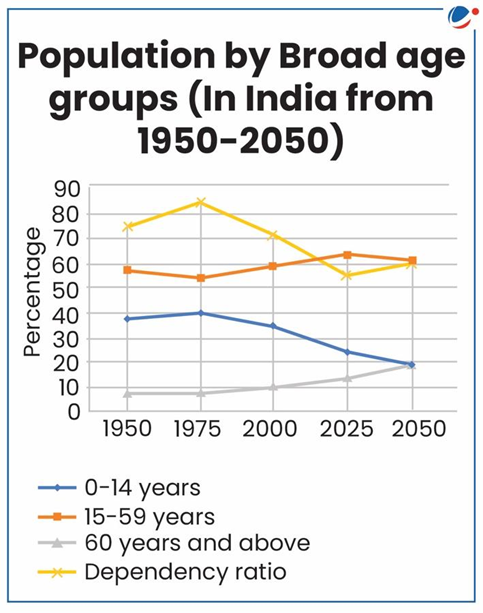Why in the News?
NITI Aayog released a position paper titled “Senior Care Reforms in India: Reimagining the Senior Care Paradigm”.
Senior care – An overview
- Demography-specific: In India, senior citizens, i.e. people aged 60 years and above, currently comprise a little over 10% of the population, i.e. about 104 million.
- 58% of the total number of elderly are women, out of which 54% are Widows
- 7 out of 10 elderly persons reside in rural areas.
- Health: 75% of the elderly have one or more chronic diseases and around 20% of the elderly in India have mental health issues.
- Diet: Food insecurity is increasing among India’s elderly.
- Pension: 78% of the elderly population survives without a pension.
- Access to Healthcare Finance: Only 18% of seniors are covered by Health insurance.
- Health-related expense is the most common cause of indebtedness (26%) in urban India.

Challenges and Issues:
- Health Domain: Quality healthcare for the elderly remains a challenge as multiple service providers (like nursing agencies, physiotherapists, etc), continue to work in silos.
- The health system, at present, is focused on Reproductive, Maternal, and communicable diseases, and NCDs, with low priority for geriatric care.
- Social Domain:
- Gaps in the implementation of social security schemes & programs. E.g. only 12% of elderly people are aware of the Maintenance and Welfare of Parents and Senior Citizens Act 2007 and the Annapurna scheme.
- Regional Divide: Considerable rural-urban inequality disfavouring rural residents.
- Gender-based disparity: Female older adults undergo the experience of poor ageing in comparison to their male counterparts.
- Inadequate elder-friendly infrastructure: Basic facilities like accessible transportation, disabled-friendly toilets, accessible buildings, etc. to enable unrestricted mobility are either missing or not maintained properly, thereby limiting the access of seniors to public places.
- Economic Domain: Many adults reach old age without sufficient savings, insurance, or public or private pensions to live on or to fund long-term care.
- Nearly 70% of the elderly are dependent for everyday maintenance on family & relatives
- Elder financial abuse has received recognition as a growing socio-economic, and public health problem.
- Digital Domain: Insufficient digital access; Paucity of digital training modules for the elderly.
- According to an Age Well Foundation Survey, approximately 85.8% of respondents were digitally and computer illiterate.
- Contribution of care work and care workers remain neglected: Care work and care workers remain undervalued and underpaid in India. Care work is often viewed as a low-skilled job and is mostly performed by women.
Key learnings from across the world:
|
Recommendations:
- Efforts to Ensure Health Empowerment and Inclusion:
- Promote health literacy among seniors and their caregivers to enhance their understanding of geriatric health issues and related risks.
- Increase accessibility of services - health camps, home-based care, mobile medical units, and other accessible platforms.
- Incentivize preventive health – health checks, annual health assessments, vaccinations, etc.
- Strengthen research & set up research institutions to enhance the knowledge repository of geriatric healthcare.
- Explore synergies between the public and private sectors through PPP in geriatric healthcare to develop low-cost healthcare delivery models/practices for filling the infrastructure gap.
- Efforts to Ensure Social Empowerment and Inclusion:
- Awareness: Efforts need to be made to sensitize the larger community on the needs and challenges experienced by the elderly, to facilitate their social inclusion.
- Legal reforms for the elderly concerns. Also, strengthen legal awareness to inform elderly persons of their rights.
- Build and strengthen provisions of Assisted Living Facilities (ALFs) like adult day-care facilities and residential care facilities.
- Elder for the elderly model: Establishing peer support groups where seniors can exchange experiences and information about various issues.
- A ‘one-stop’ centralized portal: A national portal for senior care - must be developed for senior citizens to provide easy access to services to them.
- Efforts to Ensure Economic Empowerment and Inclusion:
- Reskilling of the elderly population: Initiatives to foster age-friendly labour markets and employment opportunities.
- Increase coverage of public funds and infrastructure: Extending pension support to the elderly population from the unorganized sector as well. There is a need to revise the pension amounts to account for inflation.
- Efforts to Ensure Digital Empowerment and Inclusion:
- Improving access to digital devices for seniors by making them affordable through senior discounts.
- Focus on increasing digital literacy, especially among the elderly population.
- Private sector synergies through Public Private Partnership (PPP) models and Corporate Social Responsibility (CSR) funds can be explored in areas such as elder care homes, Private sector Insurance, Skill-building programs etc.
Senior Care Support Framework in India
|



